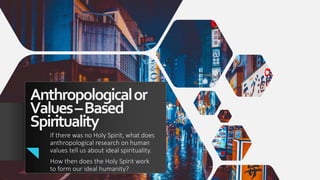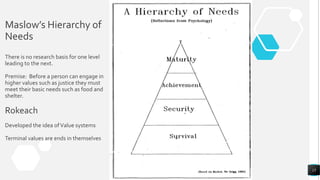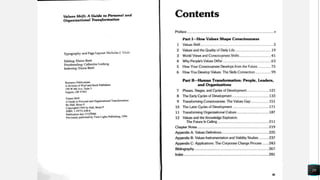520-5 Anthropological or Values-Based Spirituality
- 1. Anthropologicalor Values–Based Spirituality If there was no Holy Spirit, what does anthropological research on human values tell us about ideal spirituality. How then does the Holy Spirit work to form our ideal humanity?
- 2. ClassicalVirtues What are the 7 Godly Virtues? What are the 7 Deadly sins? How do Virtues and Values Differ? 2
- 3. 7GodlyVirtues The Three Pauline Virtues The Four Classical Greek Virtues 3 Faith Hope Love Temperance Understanding Wisdom Prudence What basic elements make up a good person? Each virtue can be analyzed in terms of feelings, behaviors and skills
- 5. SevenCardinal Sins SevenVirtues 5 (1) vainglory, or pride, (2) greed, or covetousness, (3) lust, or inordinate or illicit sexual desire, (4) envy, (5) gluttony, which is usually understood to include drunkenness, (6) wrath, or anger, and (7) sloth. Each of these can be overcome with the seven corresponding virtues of (1) humility, (2) charity, (3) chastity, (4) gratitude, (5) temperance, (6) patience, and (7) diligence. Seven deadly sins, also called seven capital sins or seven cardinal sins, in Roman Catholic theology, the seven vices that spur other sins and further immoral behaviour. First enumerated by Pope Gregory I (the Great) in the 6th century and elaborated in the 13th century by St. Thomas Aquinas,
- 6. 6
- 7. Expanding the List ofVirtues Each culture defines its own ideal virtues Each religion defines its own ideal virtues But there are universal virtues: Love, Justice, Respect, Truth… The Goal of Virtues • Aristotle: Happiness. • Thomas Hobbes (1588-1679), Baruch Spinoza: Self- preservation determines virtues. • Immanuel Kant: internal knowledge of virtue is connected to an obligation to external societal norms... 7
- 8. Virtues andValues Are they the same? • Virtues and values are ideals expressed as priorities • A Subset: Virtues are narrower in scope than Values. They have specific ends in mind. • Values are aspirational. Our reality may not reflect our values. 8
- 9. Catholic vs Evangelical Foundations to Spirituality Based on the idea of the Spirit as the Spirit of Wisdom and Understanding, who brings discernment, Catholic Spirituality places heavy emphasis on academic education as the foundation of spirituality and values are a significant theme • With a historic antipathy to outbreaks of revival there has been a historic avoidance of the “enthusiasms” of the Spirit in many Catholic circles • Education builds values imposed from the outside, external norms imposed by society through education. • (But there are also Catholic orders of the Holy Spirit who seek various patterns of mysticism). Evangelicalism • Is founded on a multiplying web of revivals around the globe, growing out of Franciscan, then Pietist revivals • The presence of the Spirit is core to our understanding of spiritual growth or Sanctification. • Spirituality is thus an outworking of his overwhelming presence. • That presence brings inner values change 9
- 10. Psychological andEducational Theoriesof Development Most have significant basis in analysis, some are purely theories that became popular. 10
- 11. Kohlberg and Moral Development 11 • An educational theorist • He built off Piaget’s educational theories. • Values emerge through a developmental process • Just as cognitive skills develop so does our ability to choose right from wrong.
- 13. Stages of Personal Spiritual (Mystical) Development 1. Over 100 years what are the developmental stages of life? 2. What are the stages of spiritual growth? 3. How do these map onto each other? Do they? Stage 1Title Lorem ipsum dolor sit amet, consectetuer adipiscing elit. Stage 2Title Lorem ipsum dolor sit amet, consectetuer adipiscing elit. Stage 3Title Lorem ipsum dolor sit amet, consectetuer adipiscing elit. Stage 4Title Lorem ipsum dolor sit amet, consectetuer adipiscing elit. Stage 5Title Lorem ipsum dolor sit amet, consectetuer adipiscing elit. Urban Leadership Foundation/ Anthrologilical Spirituality 013
- 14. LIFE PHASES ROADMAP BIRTH Q1 Transition 1 Milestone description Q2 MILESTONETITLE Milestone description Q3 MILESTONETITLE Milestone description Q4 MILESTONETITLE Milestone description YOUTH Q1 MILESTONETITLE Milestone description Q2 MILESTONETITLE Milestone description Q3 MILESTONETITLE Milestone description Q4 MILESTONETITLE Milestone description EARLY ADULT HOOD Q1 MILESTONETITLE Milestone description Q2 MILESTONETITLE Milestone description Q3 MILESTONETITLE Milestone description Q4 MILESTONETITLE Milestone description OLD AGE 014
- 15. Maslow’s Hierarchy of Needs There is no research basis for one level leading to the next. Premise: Before a person can engage in higher values such as justice they must meet their basic needs such as food and shelter. Rokeach Developed the idea ofValue systems Terminal values are ends in themselves Ten Economic Values • . • . • . 15
- 16. TheTonna-Hall Inventory An Anglican Priest-psychologist and a Catholic Monsignor built on these theories to develop the Tonna-Hall inventory of 132 value pairs. • They then sought to arrange them according to phases of life • They sought to analyse the turning points or paradigm shifts between phases • They applied them to group formation of collective values in organizations or movements. • They did a lot of research along the way, but the foundations of these theories is shaky as they pulled from multiple sources, and the complexity of trying to integrate them into a grand theory is likely beyond human capacities. • But it is of interest to reflect on these dynamics and discern ones values. • Then to consider how does the Holy Spirit form such values within us and our people. 16
- 17. Tonna-Hall Inventory and Your Inner Urban Journey Six Perspectives From Psychology, Education and Spiritual Growth Theory as to the Various Phases of Life. Based on this Tonna and Hall identified 132 universal value pairs and how these develop at each of these six stages 17
- 18. 18
- 19. 19
- 20. 20 Next: How do our values impact the Urban Context at various life stages?
- 21. Not just inner moral values Not just social moral values How do these relate to our urban context? If the Kingdom is both the redemption of our humanness and of our relationship to the land, what values are distinctly earthy in our Christianity? Do these exist in: • Islam? • Hinduism? • Pentecostalism? • Presbyterianism? • Liberation Theology? 21 Environmental Spirituality?
- 22. 22 Or How Does the Urban Context Impact these Life Stages and Values? Our anthropological spirituality is impacted by our sociological realities
- 23. ??? Comparison of EconomicValues and SpiritualValues Values are an ethereal idea, formed in philosophy, education, psychology…. If the Kingdom is both the redemption of our Humanness and of our relationship to the Land, what values are distinctly earthy in our Christianity? Spiritual Values Ten Economic Values 23
- 24. Expansion ofValues from individual to community to movement to nations 24 20YY 20YY 20YY 20YY 20YY Development ofValues overTime • In early years master the scriptures (inner values, spiritiual discpleship) • In our young adult years, master economic realities (ten economic principles, economic discipleship) • In middle years master the disciplines of a movement (social values) • In later years master the disciplines of interconnectivity (discipling nations) • In final years master philosophies (power conflict)

























